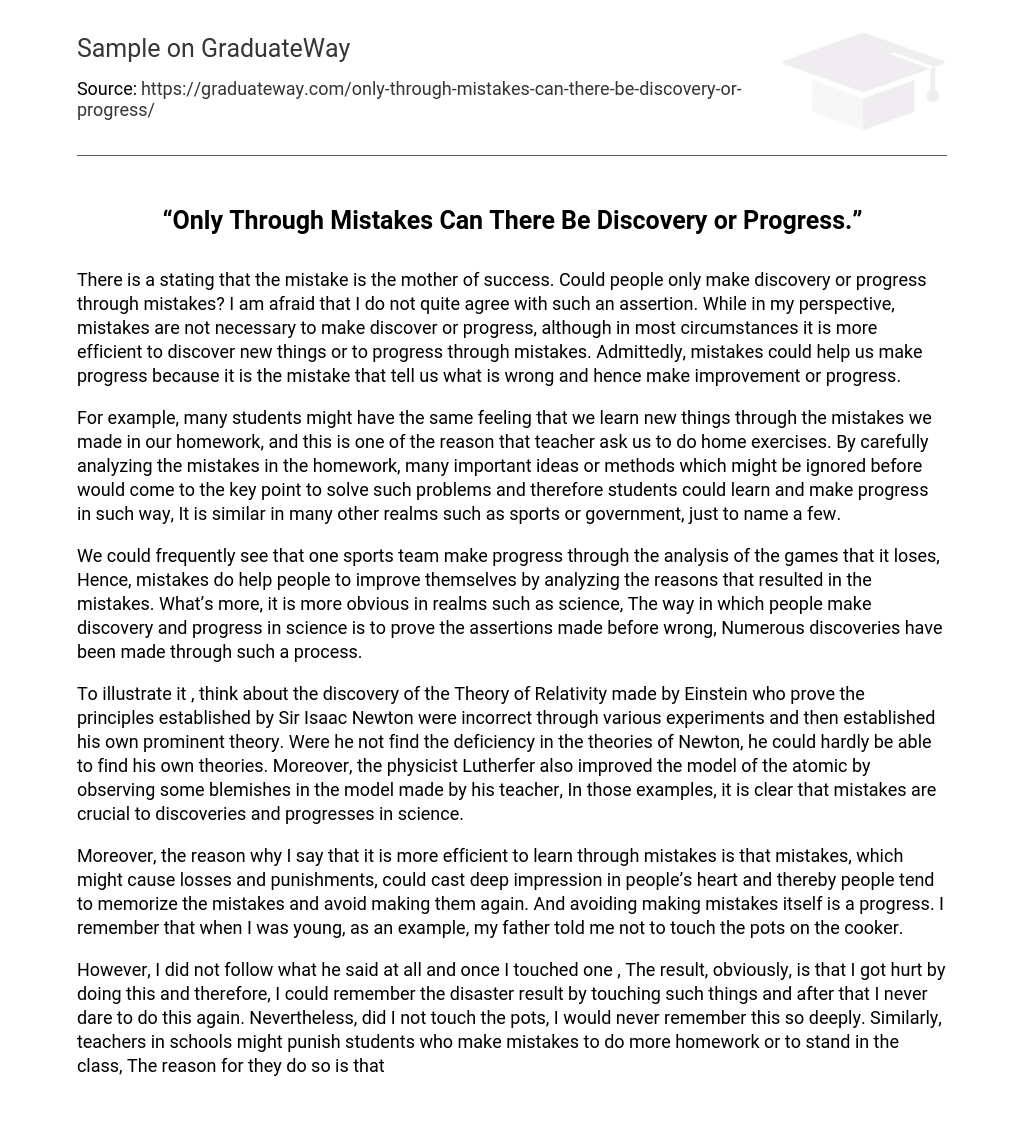While it is often said that mistakes are essential for success, I partially disagree with this notion. Although I acknowledge that mistakes may not always be a prerequisite for making discoveries or progress, they can be a considerably more effective approach in the majority of cases. Nonetheless, I concede that mistakes do have the potential to contribute towards progress by highlighting our errors and consequently guiding us towards improvement.
Homework assignments are given by teachers to help students understand the importance of learning from their mistakes. Through analyzing these mistakes, important ideas and methods that were previously overlooked can be discovered. This newfound understanding allows for more effective problem-solving and promotes progress in learning. The concept of learning from mistakes is applicable not only to homework but also extends to other areas such as sports and government.
It is common to observe a sports team making progress by analyzing the games they lose. Therefore, mistakes can actually be beneficial as they provide an opportunity for self-improvement through the analysis of their causes. This principle applies even more prominently in fields like science. The process of making discoveries and advancing in science often involves proving previous assumptions wrong. Many significant discoveries have been made through this particular process.
In order to demonstrate this point, let us consider the discovery of the Theory of Relativity by Einstein. Through various experiments, Einstein proved that the principles established by Sir Isaac Newton were incorrect and instead proposed his own prominent theory. Had he not identified the deficiencies in Newton’s theories, it would have been difficult for him to develop his own theories. Similarly, physicist Lutherfer improved upon the atomic model by identifying flaws in his teacher’s model. These examples clearly show that mistakes play a crucial role in scientific discoveries and progress.
Furthermore, learning through mistakes proves to be more efficient because the memory of mistakes can leave a lasting impact on individuals, making them more likely to remember and avoid the same errors. The act of avoiding mistakes signifies personal growth. For example, in my own experience, my father explicitly warned me as a child not to touch the pots on the cooker.
However, not understanding what he said, I still touched one. As a result, I inevitably got hurt and it served as a strong reminder to never do it again. If I hadn’t touched the pots, I wouldn’t have remembered the consequences so vividly. Similarly, teachers may punish students who make mistakes by assigning extra homework or making them stand in class. The rationale behind this is that through mistakes and punishments, students can enhance their learning. I must admit that this method is effective.
However, it is not a certainty that progress or discoveries cannot be made without mistakes. Mathematics provides a convincing example of this. Any progress or discovery in mathematics is the outcome of attempting to solve a problem from a different angle. Because established concepts in mathematics cannot contain mistakes, as long as the proof is correct, no errors can be found. The concern for the correctness of the proof process falls upon school teachers.
Contrary to science, progress in mathematics does not necessitate errors. Similarly, the field of arts presents challenges in determining what is correct or incorrect, making mistakes less prevalent. Nonetheless, absence of mistakes does not imply a lack of potential for innovation and advancement in art. Renowned figures such as Homer, Shakespeare, Da Vinci, and Van Gogh have greatly influenced the progression of this creative domain.
The essence of art is found in the distinctive viewpoint from which artists perceive the world, nurturing creativity and inspiration. Rather than attempting to disprove others, the emphasis should be on personal interpretation. Consequently, mistakes are not necessary for making discoveries and achieving progress in the field of art. Although errors can sometimes lead to easier revelations and advancements, they are not universally essential. The notion that progress exclusively arises from mistakes and a relentless pursuit of them is irrational and potentially dangerous.





